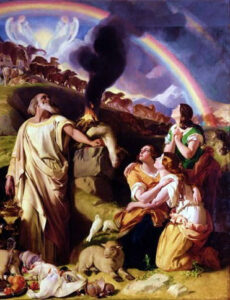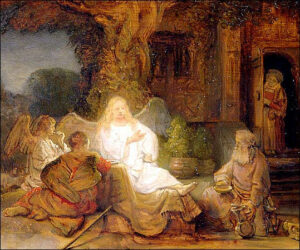We find ourselves in the midst of the Torah’s beginning cycles — somewhere between reading about ‘Noah and the Flood’ on the one hand and Abraham and the challenges he meets on the other. It is of special interest to us that Noah is depicted in such superlative terms, especially in that his name, Noah or נח is really a reverse anagram of חן, or to be more accurate, it should be understood as code in the Torah for ‘grace,’ as in ‘there but by the grace of Gd go I’ — nothing less.
But then again . . .
If we were to review (some would say even ponder) the Noah story in its entirety, we might be inclined to believe that Noah was some sort of a role model par excellent (and please notice that I didn’t write ‘perfection’). You might then say, but does not the Torah actually say that he was ‘righteous and whole-hearted’ . . . . yes, but what does that mean?

Noah’s Sacrifice, Daniel Maclise
Perhaps Noah was just ‘not enough.’
|
ח וְנֹחַ, מָצָא חֵן בְּעֵינֵי יְהוָה. |
8 But Noah found grace in the eyes of the LORD. {P} |
|
ט אֵלֶּה, תּוֹלְדֹת נֹחַ—נֹחַ אִישׁ צַדִּיק תָּמִים הָיָה, בְּדֹרֹתָיו: אֶת–הָאֱלֹהִים, הִתְהַלֶּךְ–נֹחַ. |
9 These are the generations of Noah, Noah was a man,. righteous and whole-hearted; Noah walked with God |
___________
And we might resolve to leave it right there — righteous, whole hearted, blameless, even simple (i.e. תם / תמים, as in ‘the simple son’ from the Passover Seder). And we also might begin to wonder, if we accept the premise of ‘simple’ — was he really so simple and so blameless? What or who was this Noah at a time from before the Ark was even constructed or described?

Here is a partial context . . .
|
יג וַיֹּאמֶר אֱלֹהִים לְנֹחַ, קֵץ כָּל–בָּשָׂר בָּא לְפָנַי—כִּי–מָלְאָה הָאָרֶץ חָמָס, מִפְּנֵיהֶם; וְהִנְנִי מַשְׁחִיתָם, אֶת–הָאָרֶץ. |
13 And God said unto Noah: ‘The end of all flesh is come before Me; for the earth is filled with violence through them; and, behold, I will destroy them with the earth. |
|
יד עֲשֵׂה לְךָ תֵּבַת עֲצֵי–גֹפֶר, קִנִּים תַּעֲשֶׂה אֶת–הַתֵּבָה; וְכָפַרְתָּ אֹתָהּ מִבַּיִת וּמִחוּץ, בַּכֹּפֶר. |
14 Make thee an ark of gopher wood; with rooms shalt thou make the ark, and shalt pitch it within and without with pitch. |
_______
Gd then continues, telling Noah . . .
|
יז וַאֲנִי, הִנְנִי מֵבִיא אֶת–הַמַּבּוּל מַיִם עַל–הָאָרֶץ, לְשַׁחֵת כָּל–בָּשָׂר אֲשֶׁר–בּוֹ רוּחַ חַיִּים, מִתַּחַת הַשָּׁמָיִם: כֹּל אֲשֶׁר–בָּאָרֶץ, יִגְוָע. |
17 And I, behold, I do bring the flood of waters upon the earth, to destroy all flesh, wherein is the breath of life, from under heaven; everything that is in the earth shall perish. |
|
יח וַהֲקִמֹתִי אֶת–בְּרִיתִי, אִתָּךְ; וּבָאתָ, אֶל–הַתֵּבָה—אַתָּה, וּבָנֶיךָ וְאִשְׁתְּךָ וּנְשֵׁי–בָנֶיךָ אִתָּךְ. |
18 But I will establish My covenant with thee; and thou shalt come into the ark, thou, and thy sons, and thy wife, and thy sons’ wives with thee. |
Actually, quite fascinating, but my comment is not in reference to what Gd says, instead it is fascinating in what Noah says. Actually, we do not know what Noah says, because, yes, you guessed it — he says nothing. All we have is a reference to what he does upon hearing Gd’s instructions.
|
כב וַיַּעַשׂ, נֹחַ: כְּכֹל אֲשֶׁר צִוָּה אֹתוֹ, אֱלֹהִים—כֵּן עָשָׂה. |
22 Thus did Noah; according to all that God commanded him, so did he. |
Essentially what we have here is a Noah who is ‘Ish Taamim’ — ‘blameless, pure, and simple,’ a Noah who simply does what Gd tells him to do and he does it — and we uphold that as praiseworthy and laudable.
In the absence of instruction or responsibility, do no harm — but this begs a question, was this really ‘no harm’ or was the society really too far gone and there was no saving it.
As it was understood in the Torah, it was in fact too far gone and we the readers, like Gd, are willing enough to leave it right there, ‘too far gone’ and unredeemable . . .
ה וַיַּרְא יְהוָה, כִּי רַבָּה רָעַת הָאָדָם בָּאָרֶץ, וְכָל–יֵצֶר מַחְשְׁבֹת לִבּוֹ, רַק רַע כָּל–הַיּוֹם.
5. And the LORD saw that the wickedness of man was great in the earth, and that every imagination of the thoughts of his heart was only evil continually.
Noah does nothing more than what he is told to do – he is told to build an Ark and he does. Otherwise, not a peep. The only regret we see is that shown by Gd at the beginning of the story when Gd regrets that he has made man . . .
|
ו וַיִּנָּחֶם יְהוָה, כִּי–עָשָׂה אֶת–הָאָדָם בָּאָרֶץ; וַיִּתְעַצֵּב, אֶל–לִבּוֹ. |
6 And it repented the LORD that He had made man on the earth, and it grieved Him at His heart. |
and then we see a small inkling at the end of the Flood when Gd resolves never to do it again . . .
|
כא וַיֹּאמֶר יְהוָה אֶל–לִבּוֹ לֹא–אֹסִף לְקַלֵּל עוֹד אֶת–הָאֲדָמָה בַּעֲבוּר הָאָדָם, כִּי יֵצֶר לֵב הָאָדָם רַע מִנְּעֻרָיו; וְלֹא–אֹסִף עוֹד לְהַכּוֹת אֶת–כָּל–חַי, כַּאֲשֶׁר עָשִׂיתִי. |
21 and the LORD said in His heart: ‘I will not again curse the ground any more for man’s sake; for the imagination of man’s heart is evil from his youth; neither will I again smite any more everything living, as I have done. |
One might wonder if doing what one is told is enough to satisfy the ethics and the morality of a generation. Is ‘following orders’ really a sign of righteousness and ‘obeying without question’ a sign of grace? These are not easy questions to ponder, let alone answer. Truthfully, they have been debated for centuries, millenia even . . .
____
In our class gathering we are going to have a little closer look at Abraham, a multifaceted character who fascinates us to this day.

It is known that we define ourselves as the Children of Abraham and remain so to this very day, even though we are equally, if not moreso, the Children of Noah. Why is it that we choose to identify ourselves as the Children of Abraham, especially in light of the moral flaws and ethical deficiencies he displays during his lifetime, especially towards his wife/wives along with his children and towards others, strangers and home-born alike?
We will examine these questions along with Abraham’s character on Sunday at 3:00 PM EST US. Please use the same link as last week and definitely please come to class, it is a great opportunity to test your knowledge in both an understanding of Judaism in general and in an understanding of ourselves as individuals.
